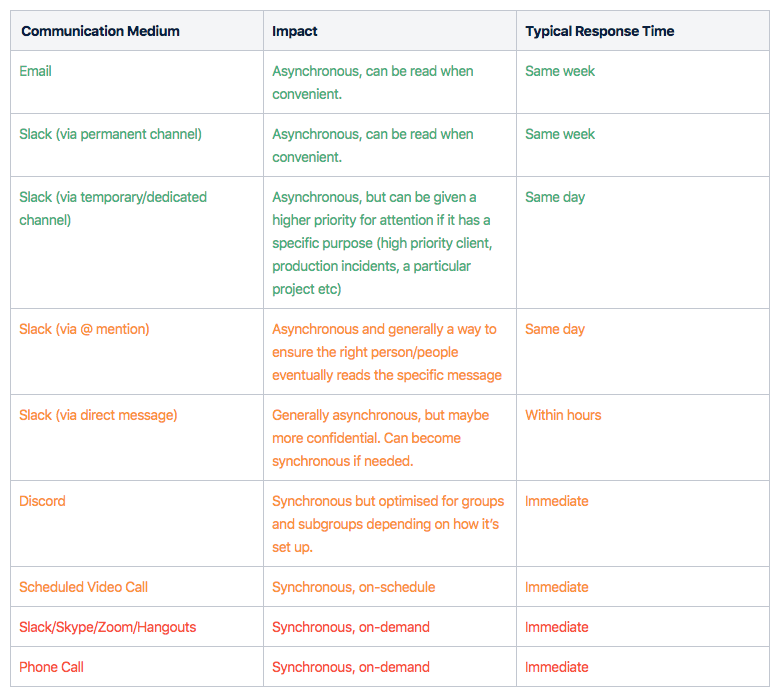As the whole company is learning first-hand, communicating with your colleagues is very different when working from home than it is when working from the office. There have been some pleasant surprises, but also some struggles and concerns.
The following material discusses strategies for effective remote communication which will hopefully help us settle more comfortably into a sustainable remote working culture by cultivating healthier communication habits.
This started as internal company literature, but we hoped it might be useful to other companies too! Feel free to connect with us via the comments.
🏡 Office vs Remote
In an open-plan office, everyone is immediately available. You can walk up to your colleague’s desk and get an instant answer to the question you have.
Office environments are optimised for synchronous communication, which can be ideal for intensive planning sessions where you need multiple people all focussed on the same challenge at once and all available to freely share their ideas together. It’s also nice for casual discussion and spontaneous chats.
Remote working tends to be optimal for asynchronous communication, where people reach out to you via digital channels like Slack or email. This is really useful for doing any kind of deep work where you need to focus solo on some tasks (coding is a pretty standard example here, but there are many other tasks like this that require focus).
With much of the company currently working from home, it’s important to take a deliberate and active approach to communicating with each other.
Being Deliberate
Working remotely forces deliberate communication. There are no accidental conversations as we randomly bump into people in the corridor — we need to deliberately instigate conversations (this includes social conversations too!).
Our HR team has set up virtual coffee chats, games, support groups, and even a company version of MTV Cribs! It’s important to make time to have fun together.
🔀 Asynchronous vs Synchronous
Many people wonder when starting out remote working: Should I always be available?
The answer is: probably not.
While you should certainly be somewhat connected, it can become very stressful and anxiety inducing to be glued to the laptop all day and pouncing on every notification.
Also, if you’ve got into deep focus on something then it can take quite a while to get your focus back when an interruption is over. In technology, this is referred to as a context switch and is known to come with a certain cost to productivity.
Asynchronous communication isn’t better than synchronous communication, but each mode of communication is definitely more appropriate for given tasks and circumstances.
📺 Finding The Right Channel
Depending on the urgency/complexity of a conversation, the chosen channel can make a world of difference to the immediate impact on remote colleagues.
Lightweight/asynchronous means of communication are known as low bandwidth channels. For many types of conversation, lightweight is perfectly fine. A response needn’t be immediate.
Some conversations are better as synchronous conversations and require high bandwidth i.e. all participants must be available simultaneously for the full duration of the conversation but their disruptive potential needs to be balanced against their importance.
Here are some typical communication channels organised in order of impact.

It’s not always clear which channel is the most appropriate.
If there are serious consequences for delaying the conversation then it’s justifiable to make the conversation synchronous and immediate.
If the conversation is complex and needs a lot of participants then it’s justifiable to make it synchronous and scheduled. Though it should be documented, and it may be possible to have it asynchronously too.
In other circumstances, it’s probably fine to choose a more lightweight channel.
The Rule of Three
One old rule in business communication is “the rule of three”.
“If it takes more than three emails, schedule a call. If it takes more than three calls, schedule a meeting.”
The key is to escalate to a higher bandwidth channel when the need arises, but to favour the lower bandwidth channels otherwise.
This helps people organise their working day in a way that suits them and minimises interruption.
📅 Scheduling Meetings
Generally, most coordination across teams can be handled with scheduled meetings. These may be regular catchups each week, or planning/coordination/client meetings that crop up as part of ongoing work.
One thing to be aware of is: there’s no such thing as a quick meeting. There’s generally buffer time before and after a meeting to switch context and if you have a lot of meetings it breaks up the day into small pieces, making it hard to get a decent stretch of focused time.
One exception to this is “pairing” meetings where one person shares their screen via remote video and then another discusses the work on screen with them. Pairing can happen with groups as well, but two is more common.
Details, please!
It may sound obvious, but don’t forget to give details on your meeting invitations:
- Set a meeting topic & description in advance so people can prepare. Include relevant links.
- Have a goal for the meeting so everyone joins with the same aim, and it’s clear whether the meeting achieved its intentions.
🗣 But what if I want to be highly available?
Some teams need to be highly connected to each other, depending on the work they’re doing.
Using the Discord app is a good middle ground because you can join a channel and have voice communication with other people in that channel. This mimics sharing an office with people because you can instantly get each other’s attention.
✍️ The Power Of The Written Word
Communication channels where participants write their messages have a considerable advantage over channels that use the spoken word — their contents are recorded for future readers. People who haven’t even joined the company yet can benefit from every discussion and decision that is documented as text.
Conversations that start out on Slack, or JIRA, or email, or on comment threads in various tools can be revisited and even used as the basis for a more distilled Confluence document later on.
The up-front cost is being comfortable and confident with writing your thoughts down clearly, as opposed to relying on being able to say it verbally. This takes time and practice but is well worth cultivating!
Further Reading
- How We Communicate — Basecamp
- Deep Work — Cal Newport
- Remote: Office Not Required — Jason Fried
- Digital Minimalism — Cal Newport
- It Doesn’t Have To Be Crazy At Work — Jason Fried
- Walden — Henry D. Thoreau
🚀 Want to find out more about Stuart? Follow this link
